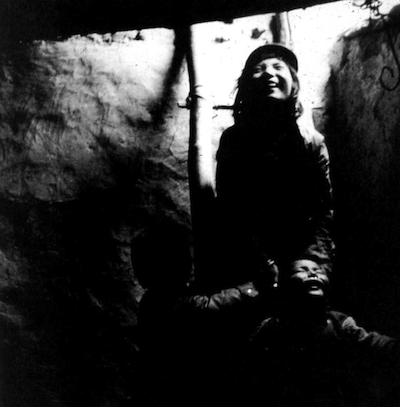
Tricycle: You just finished a two-week retreat. What practice did you actually do?
Gere: It was a Tibetan deity yoga practice, mostly mantra and visualizations. It’s quite an intricate practice. Certainly at this point, I don’t know how to do it perfectly, and probably won’t for many years. It’s like playing the piano: you have to keep doing it and keep doing it.
Tricycle: Did you devote most of the day to practice sessions?
Gere: Yes. When my teacher was laying out the parameters for me, he said it would probably take me about three weeks to do it. But unfortunately I had some other commitments and had to get this done in two weeks. So I was practicing about 10-12 hours a day. I was pushing pretty hard. There was one really bad long day where I just was totally haywire—what the Tibetans call the “winds” had gone nuts. I didn’t know where I was. I was lost, didn’t know what to do. And unfortunately my teacher was in India at the time.
Tricycle: There was no one to talk to?
Gere: I talked to a monk friend, and he said basically, you’re pushing too hard, just relax, just drop it, right now, drop everything. Take the rest of the night off. I was doing practice until two in the morning. On most retreats they say to make your practice sessions and your days the shape of a barley seed: you start kind of short and easy, and as you get into it, it’s thicker and longer and heavier and more meaty, and toward the end you taper it off to come down to this life again.
Tricycle: You didn’t have a come-down time?
Gere: I didn’t have a come-up time or a come-down time. I started like—wham! twelve hours a day and it was way too much.
Tricycle: How did you feel after the retreat ended?
Gere: There was a very interesting moment afterward on the way to the airport. I was doing the practice, doing the mantras, and I burst into tears, just spontaneously. As soon as I said the first mantra in that sequence, I was just—just swimming—after what I had gone through these past years. I had to relive every moment of the marriage in this retreat—every moment.
Tricycle: How does your practice affect your emotional life?
Gere: I’m assuming that one day I’ll be able to clear myself and expand myself and become everything I want to be—become a Buddha. But even then I would still be able to retrieve all these negative moments—moments of pain, moments of anger born of attachment and born of all the defilements—just the way an actor does. I’m pretty clear about using emotions as an actor. They’re what allows me to be human. The same is true for highly evolved beings. I don’t know any teacher who is devoid of those emotions, but the attachment to them is absent. They’re not used to bludgeon or to harm. But they’re absolutely there and they’re used skillfully. I don’t think a teacher could be skillful without having use of all the full range of human emotions in the same way that Manjushri [Bodhisattva of Wisdom] manifests himself as Yamantaka [Subduer of the Lord of Death] skillfully.
Tricycle: Doesn’t an actor do that, too?
Gere: Well, that’s the gig. I’ve talked to His Holiness [the Dalai Lama] about this many times, and he’s asked if those are real emotions I feel when I’m acting. Once I said that ultimately it’s better work when you’re really feeling, meaning when emotions come spontaneously and mysteriously and fully. They’re real. You believe they’re real.
He looked very deeply into my eyes for what seemed like a very long time, and he just started laughing. He thought it was the funniest thing.
Tricycle: What was the joke for him?
Gere: Well, I still wonder about that. I think it’s the illusory nature of emotions that he was amused by. How funny to think they’re real. Even in this bogus context of acting, I’m aware that I am making these emotions happen. I’m the magician who’s making these emotions appear, and yet I still think they’re real. That’s the difference between me and an enlightened person: an enlightened person always knows.
There is a peculiar thing that happens with acting: there’s a watcher element as one’s feeling something. There’s a side of an actor that is absolutely aware that you’re wired into something good. You know you’re where you want to be and this character is expressing himself and you’re riding that crest with this character and you’re watching it and being exhilarated by being carried along by the ride. And obviously there are other times when you know the character isn’t there and you’ve got to manufacture the whole thing and hope that you’re a good enough magician and that people are going to buy it, which is most of the time.
Tricycle: So you’re saying that at the same time that you’re riding it, you’re also watching it happen.
Gere: There is a part of consciousness that is aware of it happening as it’s happening and can comment in some way, that can feel the exhilaration of it and can feel the flood of energy of what an actor takes to be the “reality” of it; the pure reality of reality is exhilarating and filled with heat and light.
Tricycle: Has practice changed anything about acting for you, or has acting changed anything in your practice?
Gere: It’s possible that acting has made practice a little easier for me. The imaginative process, the visualization process, is what I do for a living. My nervous system is attuned to that. It’s the same way you dive into a yidam [deity yoga practice]. My nervous system and my mind are used to playing in this way. In fact, I remember very clearly one of the first Tantric initiations I ever went to—a Kalachakra [wheel of time]. This would have been the early eighties. And Alex Berzin [American teacher/translator] was describing this process to people who had never been around Tantra before. He was giving these little classes to help Westerners who didn’t know anything about it, describing it very much like a rehearsal process in the theater. You rehearse this role of deity, of the yidam, in great detail, and then there comes an opening night. And on that opening night, you’re out there, and you think, “This isn’t rehearsal anymore. I’m doing it.”
Tricycle: Does it feel like you’re doing it, or like it’s being done?
Gere: There’s a certain joy in feeling you’re doing it. It’s a sense of accomplishment. It’s important in all practice to realize that you’re the one that’s creating the ground for it to happen. Not that you are it, or that your ego identifies with it, but that you can take responsibility for having created the fertile ground for this thing to happen. You know, the correct theatrical lights and costumes and feeding it with the right energy so that the magic happens. I think that’s important, to take credit for it. It adds confidence and strength to the practice.
Tricycle: But at the same time, ultimately, it’s not really you.
Gere: No, absolutely not. It has nothing to do with your ego. But the irony is that you can feed your ego positively, I think—your sense of who you are and what your accomplishments are and who you want to become. Confidence is very important.
Tricycle: How did a kid from Syracuse, New York, end up doing this weird stuff?
Gere: Every time I sit down and wrap my legs up over my knees, I see this image of myself, and I say, “Where the fuck did this come from?” I have no idea.
Tricycle: Did you have a first book that influenced you, or some teacher or lecture you heard?
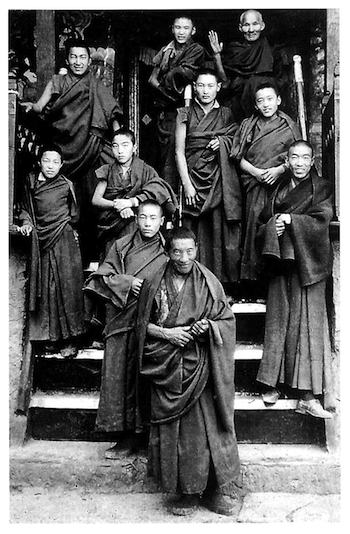
Gere: It was about philosophy. I was interested in Jean-Paul Sartre when I was a teenager. Who knows why. Carrying around Being and Nothingness under my arm. I probably didn’t even read more than one chapter. But somehow it was important for me to identify with that exploration, that adventure of figuring out what is existence, what is being, what is reality.
A book that meant a lot to me wasCrack in the Cosmic Egg, about one’s assumptions about reality. There was also a philosopher named Bishop Berkeley, whose thesis was subjective idealism. Essentially, subjective idea-ism, the subjectivity of reality, of mind itself, the fluidity of reality.
So my mind was working in that direction before dharma ever came near me, before I was ever aware of it. I was intrigued, but emotionally I was desperately unhappy. I was fucked, totally fucked, and I didn’t know how to make it stop. So I started seeking, saying, “Why am I unhappy and how can I get out of this?” You know the First Noble Truth actually works [laughing].
I was in a pretty desperate situation and couldn’t find any way out, and the Eastern things started making sense to me. I was seeing them magically, frankly. The idea of emptiness, shunyata—that I was going to disappear—was a positive thing to me. I would be negated and there would be no more pain because there would be no me. And, I think I’m still hoping that will happen [laughs], but I see it in a slightly different way now. It was suicide, essentially, that I was looking for: a way just to get out.
I was going to bookstores in the West Village a lot: reading Hindu stuff, Sufi stuff, Buddhist stuff, Jain stuff, Charles Tart, Castaneda—almost anything. And it was exciting. I started doing T’ai chi. I had this tiny loft, a big motorcycle, and a leather jacket. It was kind of a strange combination.
Tricycle: Was Tibetan Buddhism your first practice?
Gere: The first practice I did was actually TM—transcendental meditation. I went to some classes. But then I looked around and said these are all beginners and there aren’t any real teachers. There were facilitators and people who passed on certain information, but not real teachers. But it gave a touch of actually having some kind of a practice, some kind of discipline for entering the stream of dharma. Then I became more interested in what I thought was more serious stuff, more associated with teachers who have real wisdom, and Zen was really what turned me on.
Tricycle: Who was your first Zen teacher?
Gere: The First Zen Institute of America in New York was the first place I did formal sitting in a group and where I got used to the sounds and rhythms of doing practice. It was nice, doing practice in a group like that. I miss that quiet group sitting, which I haven’t found in the Tibetan tradition. Then I got serious and did a sesshin [intensive practice period] with Sasaki Roshi in L.A. I must have been about twenty-four at the time. It was a three-day sesshin.
Tricycle: What style was it? With koan, or shikan-taza, just sitting?
Gere: Both. It was zazen: shikan-taza, koan. Every day you go in for dokusan [face-to-face study with the master], and there would be four or five people who would be rushing to do dokusan. They all had something to tell the roshi, and I would think, Oh, fuck, I’ve got nothing, absolutely nothing. The first time I started mumbling, and he just stopped me and said, “More zazen” and threw me out of there [laughing]. And then the next day it was the same thing. Another twelve hours go by, and I’m starting to break down. My back’s killing, my legs are killing, my everything’s killing—I mean screaming. That was a rough process. Dealing with my brain at that point was very painful. So I don’t want to go in there [laughing] because I’ve got nothing. I’m stupid and I’m fucked and I’m lost and I’ve got no right to be here and I’m scum. So I start crying. I want him to really like me and think I’m sensitive. So I cry. And he laughs and tells me to go out and do more zazen. Anyway, you try every possible thing that you could to get out of the fact that your brain cannot wrap itself around this. Eventually, like the third day in, I didn’t want to go in. They made me go in and I did my prostrations and I went in and I was so lost I just sat there silently and he sat there with me and said, “Okay, now we can begin.”
Tricycle: Do you do a daily sit?
Gere: Since I was twenty-four, for a minimum of forty-five minutes—maybe two hours if I’ve got a lot of time that day. Even when I’m making a movie, it’s a minimum of forty-five minutes to an hour.
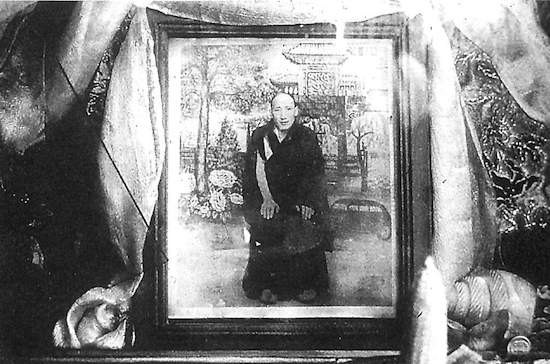
Tricycle: So you just make sure that you have the time.
Gere: Or I’ll say fuck everything else and I’ll be late for everything. I could probably count the two or three, maybe four times in the last twenty-two years that I’ve missed it because I was too drunk, too fucked-up, or whatever in the morning that I didn’t do it. And of course my day ended up worse because I didn’t do it.
Tricycle: Have you added your Tibetan practice on top of your Zen sitting?
Gere: Yes. Zen is really good for just emptying the mind, putting it down into the hara. It helped me to become very centered and focused, and extremely powerful at times, but it was very dry—I was feeling dry.
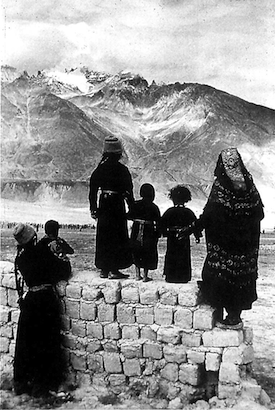
Tricycle: It was centered in the hara, not the heart?
Gere: Yeah. I think it’s a typical thing for people who work with Zen. Your sense of detachment becomes very powerful. Your sense of focus becomes very powerful. Then when I met the Tibetans that energy was brought up into the heart.
Tricycle: What was that first encounter?
Gere: With Dudjom Rinpoche. Then in the early eighties I was drawn to Tibet. I went to Dharamsala and I met His Holiness the Dalai Lama. I really didn’t know much about him, other than the title and the mystique. I was still in this Zen mode—everything had to be Japanese.
Tricycle: What was it like to meet him?
Gere: [Long pause] I felt safe. For me it wasn’t an overpowering experience of meeting someone who is coming at you with all their spiritual development, all their lights flashing. I met a genuinely wonderful man who has everything, but he’s not pushing any of it. And he very subtly destroys all your expectations of him as a god figure who’s going to make all your problems go away. He is truly a spiritual friend who wants nothing other than your happiness. In many ways, he was more patient with me in that first discussion than he’s ever been since.
Tricycle: How do you mean?
Gere: It was kind of a falling-in-love moment. It’s creating some kind of an energy bond on which things can ride. And if you pick up on the energy, it becomes something else. Pretty quickly with me it became something else. Although we’ve had easy conversations, it’s much more focused when we see each other now.
Tricycle: How does your connection with him affect your practice and your life?
Gere: It’s all gone to the heart. Every bit of the practice that I’ve done with the Tibetans is bodhichitta[mind of enlightenment]. Everything’s about the heart and unashamedly so. I love that. It’s right up front. The love word is really it for Tibetans: compassion, kindness, bodhichitta, selflessness. It’s really bold in a way that the Japanese maybe aren’t willing to be bold. Open your heart. You’ve got nothing to lose. Just go ahead and do it.
Tricycle: Did you immediately feel that the Dalai Lama was your teacher?
Gere: I wasn’t under any illusion that he could be my day-to-day teacher, but certainly, in my practice, he has a central place in all visualizations. He’s the root guru, no question about it.
Tricycle: Does he give you practice instruction?
Gere: Yes, he’s been very tough with me. He’s been very loving with me, but he can be quite tough also. He also can be very fatherly in the best sense, the arm-over-the-shoulder kind of fatherly. And he can be like a brother, very loose and colloquial. He also has been very blunt with me about my expectations of what I can accomplish in this lifetime.
Tricycle: What’s happening when he plays that fierce role with you?
Gere: I haven’t figured that out yet. I feel privileged that he really doesn’t pull punches with me. I think he takes me seriously as a practitioner, so he takes his role as teacher seriously. I’m very thankful for that.
Tricycle: And in your work with Tibet?
Gere: I spend a lot of time around His Holiness doing political work and cultural work and helping out with financial things. There are a lot of teachings in all these activities. It’s a bit confusing sometimes when one would rather be the practitioner and just see him as the deity—rather than planning and organizing. But, ultimately, it’s all teaching when you’re around a teacher. It’s inspiring.
There’s no one who gets into dharma who doesn’t think, “Shouldn’t I be a monk or a nun?” We all go through a stage saying, “I want to be Milarepa, or the female equivalent of Milarepa. I should be in a cave. I should get out and do this heavy work. And the only place I can really do it is by myself in a cave,” whatever that cave is. But more and more I realize that it’s important for us Westerners to do it within life, within activity, because we have a lot to do here. We’re very young at this, at practice, and we have to do the physical, actual thing of transforming our culture and our society. My own sense about Westerners is that we have so much karma because we are such active people that we have to work it through. I think most of us would end up with brain cancer if we went into caves, because our karma has to express itself. Not many of us are far along enough to have spiritualized our mind-streams enough to handle a cave.
Tricycle: Yet you do try to take the time to go to India for several months a year, don’t you?
Gere: This was a good year. Because of my busted marriage and all that, I needed the help, frankly. So with India and Mongolia and everyplace else, I think it was four or five months this year.
Tricycle: Has your practice changed your relationship to suffering?
Gere: Life is dharma, is teacher. When you’re younger and something horrible happens to you, it’s the end. You assume you’re always going to be in that horrible state. You don’t know there’s going to be an end moment to that and then you’re going to be someplace else. Now I’ll just ride out the bad things because I know they’re going to change.
Tricycle: Do you feel there’s a kind of payback obligation in this lifetime?
Gere: Oh yeah. The payback is to do the practice. That’s the payback to your teacher, to the Buddha, to your brother and sisters. Do the practice.
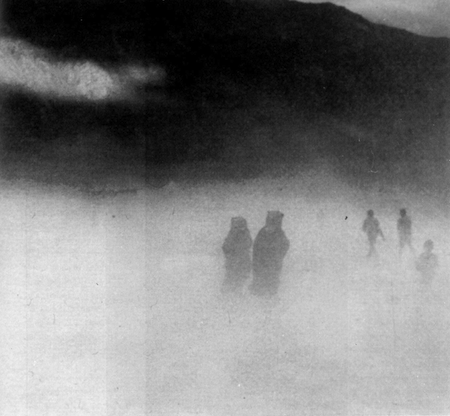
Tricycle: Do you feel that in your political work for Tibet there’s also some expression of this debt?
Gere: Absolutely. No question about it. His Holiness asked me to do it. I had no interest in talking publicly about dharma, about my Buddhist practice—the little I know. The great amount that I do know about this whole movie star celebrity thing—I didn’t want to get into that circus around Buddhism. It was too important to me, too private, to mess with, and I didn’t feel capable of handling it, frankly—keeping it clean. And then there came a point when His Holiness said, “We need help.”
Tricycle: Has anything about the practice or the teachings helped you with being a celebrity?
Gere: Yes. There are some great lines in the Guru Puja. It’s almost directly written for people who are celebrities:
Should even the myriad beings of the Three Realms without exception,
Become angry at us, humiliate, criticize, threaten or even kill us,
We seek your blessings to complete the perfection of patience not to be distraught,
But to work for their benefit in response to their harm.
In other words, although people will slander you, lie about you, wish you harm, death, throw things at you, you must remember that they are ill beings and only wish them happiness. And obviously the fact is that your internal reality, the truth of you, cannot be touched by any of that. It’s kid stuff and nothing more.
Certainly a spiritual teacher has more to lose from such gossip than a movie celebrity or a politician or someone like that. He has to watch himself more carefully because it’s really his life. It’s his whole life. My job is, I’m an actor. It’s pretty low on the scale of spiritual things. You know, no one expects much of an actor [laughing].
Tricycle: Actually, people expect the worst.
Gere: [Laughing] Thank you very much for clarifying that! No, but it’s true—it’s all a bit peculiar being an actor anyhow because you know that you play with illusory realities constantly. In many ways, if you allow yourself some degree of emotional maturity in the process of just getting older, then you’re able to see it for what it is and not be so buffeted by the winds of fortune and change.
Geshe Potawa said we are subject to eight worldly concerns: seeking material things and then feeling bad when you lose them, seeking fame and then being depressed when you don’t have it, and so on. In many ways I’m very fortunate to be able to play with those things.
Thank you for subscribing to Tricycle! As a nonprofit, we depend on readers like you to keep Buddhist teachings and practices widely available.